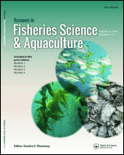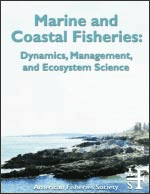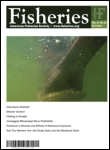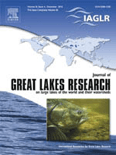
FISHERIES MANAGEMENT AND ECOLOGY
Scope & Guideline
Transforming knowledge into practice for sustainable fisheries.
Introduction
Aims and Scopes
- Sustainable Fisheries Management:
The journal emphasizes research that contributes to sustainable practices in fisheries, addressing overfishing, stock assessments, and management strategies that balance ecological health with socio-economic needs. - Ecological Interactions and Dynamics:
Publications explore the ecological interactions within aquatic ecosystems, including predator-prey dynamics, habitat use, and the effects of environmental changes on fish populations. - Technological Innovations in Fisheries Science:
Research often includes the development and application of new technologies for monitoring and managing fisheries, such as echosounder data analysis, genetic tagging, and modeling approaches. - Socio-Economic Aspects of Fisheries:
The journal also addresses the socio-economic dimensions of fisheries, including the impact of recreational fishing, community involvement, and the economic implications of management decisions. - Climate Change Effects:
A growing focus on how climate change impacts fish populations and fisheries management, with studies investigating temperature effects, habitat shifts, and adaptive management strategies.
Trending and Emerging
- Impact of Climate Change on Fisheries:
A significant increase in studies focusing on the effects of climate change on fish populations and ecosystems, highlighting the urgent need for adaptive management strategies in response to shifting environmental conditions. - Integrative Management Approaches:
Research is trending towards integrative and ecosystem-based management approaches that consider interactions among species, habitats, and human activities, showcasing a shift from traditional management paradigms. - Technological Advancements in Monitoring:
Emerging themes include the use of advanced technologies such as remote sensing, acoustic monitoring, and genetic tools for assessing fish populations and their habitats, pointing to a future where data-driven decision-making is paramount. - Recreational Fisheries and Community Engagement:
There is a growing focus on the role of recreational fisheries in local economies and the importance of community engagement in fisheries management, reflecting a recognition of the socio-economic dimensions of fisheries. - Biodiversity and Conservation in Fisheries:
Emerging research is increasingly addressing biodiversity concerns within fisheries, including the conservation of threatened species and habitats, and the role of fisheries in maintaining ecological balance.
Declining or Waning
- Traditional Stocking Practices:
Research on conventional fish stocking methods has decreased, likely due to a growing emphasis on ecological integrity and the need for more innovative approaches to enhance fish populations. - Bycatch Reduction Techniques:
Although still relevant, the frequency of studies specifically targeting bycatch reduction techniques has waned, possibly overshadowed by broader ecological assessments and integrated management strategies. - Historical Fisheries Data Analysis:
There appears to be a decline in papers focused solely on historical data analysis, as more studies integrate historical perspectives within broader ecological and management frameworks. - Single-Species Management Frameworks:
The focus on single-species management approaches has decreased, as there is a shift towards more holistic ecosystem-based management strategies that consider multi-species interactions. - Local Knowledge in Fisheries Management:
While still important, the emphasis on local knowledge and traditional ecological knowledge in fisheries management has seen a reduction, reflecting a trend towards data-driven approaches.
Similar Journals

REVIEWS IN FISH BIOLOGY AND FISHERIES
Exploring the intricacies of fish biology and sustainable fisheries.Reviews in Fish Biology and Fisheries, published by Springer, is a prestigious journal dedicated to advancing our understanding of fish biology and the principles underpinning fisheries science. With an impact factor reflective of its high citation rate and its recognition as a Q1 category journal in Aquatic Science, it ranks impressively at #9 out of 247 in the Scopus database, placing it within the top 4% of its field. Established in 1991, this journal serves as a crucial platform for researchers, professionals, and students alike, offering comprehensive reviews and insights that foster innovation and collaboration in aquatic research. Although it is not available as an open-access publication, its rigorous peer-review process ensures the dissemination of quality research that informs policy and practices in fisheries management globally. With a diverse range of topics covered, the journal is an essential resource for anyone aiming to deepen their knowledge and impact in the dynamic fields of fish biology and fisheries.

INDIAN JOURNAL OF FISHERIES
Advancing aquatic science for sustainable fisheries.Welcome to the Indian Journal of Fisheries, an esteemed publication of the Central Marine Fisheries Research Institute, dedicated to advancing the field of aquatic sciences. Established in 1974, this journal serves as a crucial platform for researchers, professionals, and students interested in the dynamics of fishery research within the Indian context and beyond. With an impact factor highlighting its rigorous peer-review standards, the journal publishes research that significantly contributes to the understanding of fisheries management, conservation, and sustainable practices. Although currently categorized in Q4 for Aquatic Science (2023) and ranked #215 out of 247 in Scopus, its increasing visibility demonstrates the journal's dedication to enriching the scientific discourse surrounding aquatic ecosystems. Located in Kochi, India, and published intermittently from 1977 to 2024, it seeks to bridge knowledge gaps while promoting innovative methodologies in fishery sciences. While not an open-access journal, it fosters a vital exchange of scholarly work that informs fishing practices, policy, and ecological considerations vital to both national and global fisheries. Join us in exploring the intricate world of fisheries through our comprehensive collection of research articles, reviews, and case studies.

Reviews in Fisheries Science & Aquaculture
Catalyzing collaboration for aquatic resource management.Reviews in Fisheries Science & Aquaculture is a leading peer-reviewed journal published by Taylor & Francis Inc, dedicated to advancing the understanding and sustainable management of aquatic ecosystems. With an impressive impact factor reflecting its high citation rates, this journal categorizes within Q1 in Aquatic Science, Q1 in Ecology, Evolution, Behavior and Systematics, and Q1 in Management, Monitoring, Policy and Law, making it an essential resource for researchers and professionals in these disciplines. Operating from the United Kingdom and accessible through open access options, the journal facilitates a wide dissemination of research findings, fostering innovation and collaboration among those committed to fishery science and aquaculture. As of 2023, it ranks remarkably within the 99th percentile across several Scopus categories, underscoring its pivotal role in shaping future research and policy. The journal has been converging insightful studies since its inception in 2014, and it continues to be an indispensable platform for scholars aiming to contribute to the critical dialogues surrounding aquatic resource management and conservation.

Marine and Coastal Fisheries
Championing open access to vital fisheries knowledge.Marine and Coastal Fisheries, published by Wiley, is a leading open access journal that has been dedicated to advancing the field of fisheries science since its inception in 2009. With an esteemed Q1 ranking in Aquatic Science and a Q2 ranking in Ecology, Evolution, Behavior and Systematics as of 2023, the journal actively contributes to the understanding and management of marine and coastal ecosystems.
This journal serves a diverse audience ranging from researchers and practitioners to students, providing a platform for high-quality peer-reviewed articles that address contemporary challenges in fisheries management and conservation. With a commitment to global accessibility, Marine and Coastal Fisheries promotes the dissemination of scientific knowledge to enhance sustainable practices in marine environments, making it an essential resource for those invested in the health of aquatic ecosystems. To explore the latest research and insights, visit the journal's website and engage with the thriving community of marine science professionals.

CANADIAN JOURNAL OF FISHERIES AND AQUATIC SCIENCES
Fostering collaboration for thriving aquatic environments.The Canadian Journal of Fisheries and Aquatic Sciences, published by Canadian Science Publishing, stands as a premier interdisciplinary journal dedicated to advancing knowledge in the fields of aquatic sciences, ecology, and evolutionary biology. With a longstanding history of publication since 1980, this journal delivers high-quality, peer-reviewed research that contributes to the understanding of aquatic ecosystems and the sustainable management of fisheries. The journal is esteemed for its rigorous standards and currently holds a Q1 ranking in both Aquatic Science and Ecology, Evolution, Behavior, and Systematics as of 2023, evidencing its significant impact in these critical areas. Researchers, professionals, and students alike can expect compelling explorations of both fundamental and applied aspects of aquatic sciences. While the journal offers traditional access, it remains committed to disseminating pivotal research findings to foster a vibrant community of scholars and practitioners striving towards innovative solutions for aquatic environmental challenges.

FISHERIES
Uniting voices for the conservation of global fishery resources.FISHERIES, published by WILEY, stands at the forefront of aquatic science and nature conservation, providing a vital platform for researchers and practitioners to share their findings and contribute to the sustainable management of global fishery resources. With an impressive impact factor and recognition within its field, the journal is currently ranked Q2 in both Aquatic Science and Nature and Landscape Conservation categories as of 2023, indicating its significant influence and quality of research dissemination. Covering a broad scope of topics from aquatic ecosystems to conservation strategies, FISHERIES facilitates cross-disciplinary discourse essential for understanding the ecological and socioeconomic aspects of fisheries. As the journal converges its years of operations from 1976 to 2024, it continues to adapt to emerging challenges in the field, making it an invaluable resource for professionals, researchers, and students alike who are dedicated to advancing knowledge and practices in sustainable fisheries management.

Fishes is a premier academic journal dedicated to the exploration and dissemination of cutting-edge research in the fields of aquatic science and ecology. Published by MDPI in Switzerland, this open-access journal has been accessible to researchers globally since its inception in 2016, allowing for the rapid exchange of knowledge that fosters scientific advancement in the study of fish and aquatic ecosystems. With its convergence in the years 2016 to 2024, Fishes proudly holds a notable position in the academic community, evidenced by its category quartile rankings of Q3 in Aquatic Science and Q2 in Ecology for 2023. The journal consistently features innovative research encompassing ecological interactions, conservation strategies, and evolutionary studies within aquatic environments. By integrating interdisciplinary approaches and encouraging contributions from a diverse array of experts, Fishes serves as an invaluable resource for researchers, professionals, and students alike, contributing to the understanding and preservation of our precious aquatic biodiversity.

JOURNAL OF GREAT LAKES RESEARCH
Empowering Ecological Insights for TomorrowJOURNAL OF GREAT LAKES RESEARCH is a prestigious academic journal published by Elsevier Science Ltd, focused on the vital field of aquatic sciences and ecology. With a long-standing history since its inception in 1975, this journal proudly ranks in the Q1 quartile across multiple categories, including Aquatic Science and Ecology, as of 2023, reflecting its significant contribution to the scientific community. The journal's impact is underscored by its impressive Scopus rankings, placing it within the top percentile of scholarly publications in related disciplines. Although it operates under a subscription model, its influence extends globally, serving as a critical resource for researchers and professionals dedicated to understanding the Great Lakes ecosystem and its broader ecological implications. As it converges into its future publications through 2024, JOURNAL OF GREAT LAKES RESEARCH remains an essential platform for innovative research that shapes environmental policy and promotes sustainable practices in aquatic environments.

FISHERY BULLETIN
Bridging Science and Practice in Fisheries ManagementFISHERY BULLETIN, published by the NATL MARINE FISHERIES SERVICE SCIENTIFIC PUBL OFFICE, serves as a pivotal resource in the field of Aquatic Science, offering valuable insights into fisheries science and management since its inception in 1881. With an Open Access model, the journal ensures that researchers, professionals, and students can access cutting-edge research freely, fostering greater collaboration and innovation within the community. The journal boasts a substantial history of publication, encompassing articles from 1979 to 2024, and has achieved a respectable Q3 Quartile ranking in its category for 2023, highlighting its influence amid its peers. It currently ranks #161 out of 247 in the Scopus database for Agricultural and Biological Sciences, with a 35th percentile ranking, indicative of the quality and relevance of its contributions. The FISHERY BULLETIN stands out as an essential platform for disseminating significant findings and advancing knowledge relevant to sustainable fisheries and marine resource management, making it an indispensable tool for academic researchers and industry practitioners alike.

ACTA ICHTHYOLOGICA ET PISCATORIA
Empowering researchers in ichthyology and fisheries science.ACTA ICHTHYOLOGICA ET PISCATORIA is a distinguished peer-reviewed journal dedicated to the field of ichthyology and fisheries science, published by PENSOFT PUBLISHERS since its establishment as an open-access publication in 1970. Based in Poland, this journal serves as an essential platform for researchers, professionals, and students aiming to contribute to the scientific understanding of aquatic life. With an impressive H-index reflecting its growing influence, ACTA ICHTHYOLOGICA ET PISCATORIA is currently ranked in the Q3 quartile within both the Animal Science and Zoology and Aquatic Science categories. According to Scopus, it holds a rank of #227 in Animal Science and Zoology and #147 in Aquatic Science, demonstrating its relevance and contribution to these fields. The journal’s commitment to open access ensures that research findings are widely disseminated, fostering collaboration and knowledge sharing among the scientific community. With a historical scope extending from 1996 to 2024, ACTA ICHTHYOLOGICA ET PISCATORIA remains a vital resource for advancing aquatic research and fostering new insights into the complexities of fish biology and fisheries management.